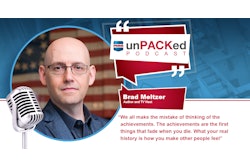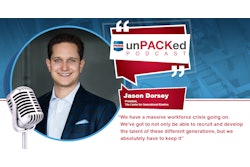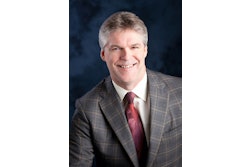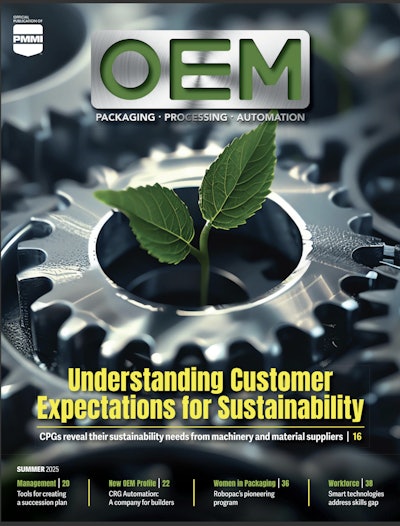Leadership is often confused with title, position, or status, with many thinking that only the men and women in charge are in a position to lead. On this episode of unPACKed with PMMI, Jonathan Darling from Schneider Electric turns that tired, old-fashioned view of leadership on its head. He will help listeners learn how to lead and how every individual can make a massive impact in their workplace and communities, even if they're not the boss.
To subscribe, rate, review, and find more unPACKED podcast episodes, visit pmmi.org/podcast or find us on Apple podcasts, Spotify or iHeart Radio.
 | Read the full transcript below |
Sean Riley:
So with all the fancy introductions out of the way, welcome to the podcast, Jonathan.
Jonathan Darling:
Thanks, Sean. Thanks for having me on.
Sean Riley:
Oh, the pleasure is all ours. Before we dive into all the things around leadership that we're going to be talking about today, why don't we get a little bit of background for the listeners. I guess if you could just tell us a little bit about how you got started in the packaging and processing industry and then I guess how you got into sales, just a little blueprint there for people so they know who they're listening to.
Jonathan Darling:
Sure. Yeah. It's interesting, Sean. I never had any intention of being in this industry. I didn't even know this industry existed.
Sean Riley:
Join the club.
Jonathan Darling:
Yeah, it was incredible. Back in 2010, I was actually running fitness centers and running gyms. I had been an exercise science major in college. A friend of mine from high school, one of my best friends from seventh grade, a guy by the name of Justin Clark, called me and he said, "Hey, I have been working at this facility supply and packaging supply distribution company. You should come, move to Knoxville, Tennessee and sell toilet paper with me." And I literally thought that sounds like a really crappy job.
Sean Riley:
Yeah, it sounds like a very sexy position.
Jonathan Darling:
Right, who wants to do that? So I said yes and moved to Knoxville, Tennessee, started in facility supplies and started realizing very quickly that I loved being in manufacturing facilities and helping those facilities improve what they were doing from an operational standpoint. Ended up doing that for several years, got recruited to a great company called Lantech, and worked my way up through there and into a leadership position.
Jonathan Darling:
Then now have been for the last eight months working as a market segment leader for North America for Schneider Electric. I look back on almost 15 years in this industry, 13 years in this industry, and go, wow, I can't really imagine ever doing anything else and really beginning to focus on how do I make the positive impact on an industry that has been so incredibly great to me and my family?
Sean Riley:
Wow! That's a very fascinating opening there. I wasn't expecting it to go in that direction. That is a very interesting path that you took as well as your willingness to give back. So I guess with that in mind, what are some of the things that you see... Let's particularly aim at younger professionals. What are the things that you're seeing that... the challenges that they're facing in this manufacturing that you've come to love?
Jonathan Darling:
Yeah. When I came into the industry and as I started really developing my skillset in sales and really starting to grow there, there was one thing that I really wanted. I wanted to be a sales manager, to lead a sales team that was just a bunch of just awesome, incredible sales people and we were just accomplishing great things and blowing numbers out of the water. So everything I was doing at that point in time was working towards being the absolute best salesperson in the company that I was working at.
Jonathan Darling:
I wanted to beat everybody, I wanted to have the best numbers, I wanted to have the most sales, the most growth. I was constantly having these conversations of, I want to be a sales manager. I want to be a sales manager. And I think it's similar to what people are facing today. They come into a position, they come into the packaging industry, and they want to make an immediate impact and they want to grow through the ranks. They want to exceed at what they're doing and excel at what they're doing and go in and make this big impact so that they can be elevated and promoted and all of these things.
Jonathan Darling:
For me, what I'm finding is, and what I've found over my career, is that as we come in and do those things, we lose sight of how we can truly make an impact and how we can truly lead our companies to create incredible change in what we're doing. A part of that is because we don't truly understand what it means to be a leader. We don't understand what it means to actually lead. So for me, I think that's part of the biggest challenge with people coming in today. They want to be leaders, they want to make an impact on their company and make an impact on the people around them, and they think they have to wait or have a certain position or title or status to be able to do that when that's actually not the case at all.
Sean Riley:
Two things, I guess, come to mind. The first thing I'm thinking is... when you're saying that everybody is coming in young and wants to be elevated and move up to these higher leadership positions, they're missing, I guess, the everyday contributions that they're making and how that is significant. And I guess the other question I have with that is, how do they frame that to realize that's something on a day-to-day basis that positions them as a leader?
Jonathan Darling:
I think we've drastically watered down the definition of what a leader is. Especially within the corporate context, Sean, I believe we've made leadership and the ideology around leadership that it is a title, position, or status, and that in order to be a leader, you have to be in this certain position, in this certain place, have this certain title. That's just 100% not the case. What I think most people miss is, one, it's not even about your production that allows you to make an impact in your company.
Jonathan Darling:
It's about how you elevate the people around you. It's not about the sales dollars that you're bringing in, it's how are you making an impact on the people around you and helping elevate them to be the very best that they can be? To me, we get so focused on self, self-promotion, self-production, self-development, that we miss what's truly the most important, which is the greater good in helping elevate others around us.
Sean Riley:
Okay. So then I'm an emerging leader and I'm trying to make an impact on my team or in my company, my operations. What's my plan or what's my way of going about that knowing that I'm not the person in charge, I'm not the manager, I'm not the boss?
Jonathan Darling:
Sure. Well, it's really beginning to realize, Sean, that even without the title, you can be a leader through how you show up every single day and the energy that you bring to what you do. Being in this industry as long as I have, the one thing that's pretty consistent, even in roles that haven't been "titled leadership roles", people have always said, "Man, Jon, the energy that you bring, the excitement that you bring, it just seems like you really love what you're doing. That's so infectious." And that's 100% true.
Jonathan Darling:
People don't realize that their positive energy is infectious just the way negative energy is. Negativity is just like a cold, it can make people sick. If you look at the studies out there and the different statistics, having a negative gratitude and being a negative person can actually increase your risk for heart disease, increase your risk for cancer. You're sick more often, you miss more days of work. We have a lot of people in this world that don't realize that the ability to control their attitude and how they show up is theirs and theirs alone.
Jonathan Darling:
One thing we say here in the Darling household, my wife and my kids and I, that our circumstances don't dictate our attitudes, we choose them. So being able to show up with that positive energy every single day, knowing that that's a choice that you can make regardless of what's going on around you or how hard things are, that energy becomes infectious and people want to be around you because... There's a quote that says, "A rising tide lifts all ships."
Jonathan Darling:
When you walk in and you have a positive energy about you and you have this positive attitude, it is infectious and it actually raises the level of energy in a room and actually can help reduce stress and anxiety with the people around you. So that's one thing that I would say to these young people, is, when you show up, how are you showing up? Are people better because you're there? Is the energy elevated because you're there? Is there a more positive atmosphere because you are there? That's one way that you can start leading and creating influence where you work with the people around you without even having a title.
Sean Riley:
Okay. I'm in complete agreement and I understand exactly what you're saying, but I'm going to go with the first thing that pops into my mind thinking about companies and how things have traditionally been run, which I think is what you are trying to fix and are butting up against, is how do you deal with the negativity that might be already on top, that might already be in charge that is purveying down and you are coming in with this positive attitude and trying to make things better and you're trying to lead by example and stuff like that, and it's being met with, A, resistance from above, and B, possibly resentment?
Jonathan Darling:
Well, I think one of the things that you have to realize is that when you lead without position or when you're not the boss, it's still important for you to lead up to your boss. It takes a lot of courage to be able to sit down with your direct supervisor or your leader and have a conversation with them about how they can best lead you. And I truly believe if we want to be led a certain way or if we want to see a more positive atmosphere, one of the ways to do that is have the conversation with the person that we're reporting to about how you need to be led and about how you are energized through a positive outlook.
Jonathan Darling:
And the thing is, is people aren't always going to be positive. People aren't always going to respond to it really well because... Regardless of what people think, you can look at all the studies, it's not the cultural norm in business. Especially in the packaging industry, what I found more than others that are more resistant to this idea of positive leadership, it's typically been more of a dictatorial or power-based leadership. So it's having that conversation with your boss about how you need to be led. The other thing is showing up every day regardless of what anybody else is doing to be your best and to operate at your best.
Jonathan Darling:
That takes a lot of courage and you have to be willing to show up and be consistent every single day in that positive attitude, because what's going to happen is, if you show up and you're consistent every single day, people are going to start noticing. And the people who are creating the most resistance, eventually, they're either going to jump on board, or I hate to say it, you're going to realize that this probably might not be the best company for you and you look for somewhere else that has a better fit culturally where that positive environment is created from the top down.
Sean Riley:
Yeah. That's where I was hoping you were going to go. I'm with you on the leading from not being at the top of the chain and trying to build yourself up and build everyone up around you through your positivity, through your everyday actions. And I was just curious, which you just answered, is how do you determine where you can only go so far with that before it's starting to affect you, it's becoming a negative for you that you're realizing that I am doing this and it is not being rewarded, it is not being appreciated, it is not helping things? You just basically said it just gets to a point where maybe the culture is just not the place for you.
Jonathan Darling:
Yeah. I think one of the things that we have to realize is, when you are leading when you're not the boss, as I like to say, and your focus is on caring for the people around you and helping elevate them and influencing positive change in their life, the ultimate goal... I truly believe this, Sean, that we were all created with these unique and special gifts, talents, and skills. And our ability to operate within those gifts, talents, and skills at the highest level is ultimately determined by two things, our willingness to do so and the environment that's cultivating the possibility of that.
Jonathan Darling:
So it's not about getting recognized for being an influential positive leader to the people around you. If you're doing it for that, if you're doing it for the recognition or the promotion, then it's a selfish endeavor because that's ultimately about you. If you're doing it because you truly care about the people beside you and you want them to be better and you want to help them become the person that operates at their best at all times, then really you don't worry about being recognized for it. You recognize the impact for each individual that you're making.
Jonathan Darling:
I think that's one of the biggest things for me, is how are you impacting people? I call it micro moments massive impact. How are you creating a positive exchange where that person is better because of that interaction with you, that small interaction. It could be the person at the gas station that you're engaging with, seeing them right there realizing that there's someone who has incredible value and you are speaking life and positivity and encouragement into that person, being there for that person if needed. Man, that impact, you don't need to be recognized for that because you're going to see it and you're going to feel it.
Sean Riley:
I mean, it's holding a door for somebody, that little interaction that everybody has every day that can... I hear you and I appreciate that. I'm just curious, this is just something that's... To flip it from the other end, what do you say from... As a guy who clearly knows leadership and... How do you flip this to the people that are currently in charge and are resistant to this?
Jonathan Darling:
Well, one, I think Bob Chapman, who is an incredible leader in the packaging industry, Barry-Wehmiller, he wrote a book called Everybody Matters. One of the things that he says about leadership, I think, is incredibly true. And I think the question ends up having to be, what's your goal? Because what Bob Chapman says is that, "Management is the manipulation of others to achieve a selfish goal, where leadership is truly caring for the people who have been put in your care." So I think the question ends up being, what's your goal as a leader? Is your goal just to achieve numbers, profit, margin, revenue?
Jonathan Darling:
Which look, none of those things are bad things, but what's your goal as a leader? Is it that or is it to make a positive impact in the lives of those that you steward and helping them become the best versions of themselves that they can be? Because I believe and the statistics show it... Deloitte, McKinsey, all these companies have studied this, is that when the investment is into the people, to care about them and develop them as a person as a whole, not just the person in a role, but the person as a whole, productivity goes up, revenue goes up, sales go up, you have a drastic reduction in absenteeism, employee engagement goes up.
Jonathan Darling:
Everything improves when the focus is the people and caring for them versus just caring about the numbers. So my question would be for those people who are hesitant to it, what's your goal? Do you want to blow your numbers out of the water? Do you want to have incredible growth as an organization and sell more than you ever have and be more efficient than you ever have and be more productive than you ever have and have less employee turnover than you ever have before? Then maybe if none of those things are changing because of the way that you're currently doing things... Michael Jackson said it best, if you want to change, then you might want to look at the man in the mirror and make a change.
Sean Riley:
Okay, I hear you. I think that would be the perfect way to put a button on this conversation. I really appreciate the time that you took. I went a little over in talking to you by asking a couple additional things, but I'm appreciative of you giving us some answers on both how people rising in the industry can learn to be leaders and can lead from within as well as some things that people in charge might want to, like you said, take a look in the mirror about and see that both sides can change in terms of leadership. So with that, I just want to thank you again, Jonathan Darling, for coming on the podcast with us.
Jonathan Darling:
Thanks for having me, Sean. Thanks for letting me share my message and love [inaudible 00:18:53] I love what you guys are doing and thanks for letting me be a part.





![Jessica Kriegel[70]](https://img.oemmagazine.org/files/base/pmmi/all/image/2022/07/Jessica_Kriegel_70_.62c719b3e153b.png?auto=format%2Ccompress&bg=fff&fill-color=fff&fit=fill&h=167&q=70&w=250)















